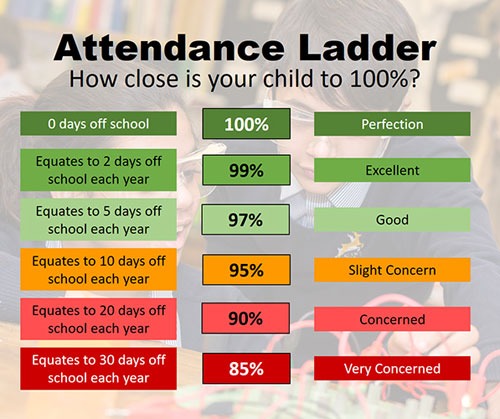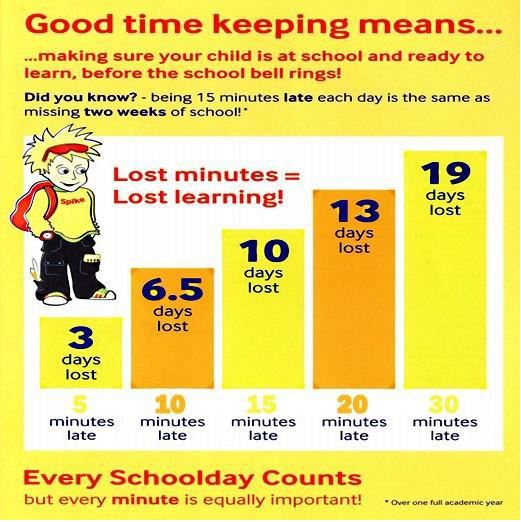Attendance
Maintaining high attendance at school is important, not just for your child’s learning, but also for their overall well-being, wider development and their mental health.
Children who habitually have good attendance are best placed to flourish and reach their academic and personal potential. There will be the same expectation when they move on to secondary school and into their future careers. It can be difficult to know when to keep your child off school when they appear unwell.
There are many instances where mild illnesses can mean children can still attend school. Mild coughs and colds can often be managed very effectively with Calpol (or similar). Staff are able to administer this in school if a medical form is completed. If your child is unwell at the start of the day and then improves during the morning, please do bring them into school for the afternoon.
Please see the useful guide from the NHS regarding working out if your child is too unwell for school:
Many parents will at some point be faced with a child not wanting to go to school. If you are having difficulties getting your child to school, please do talk to us so that we can support with a range of suggested strategies. Make sure that you give these strategies time to work.
At Warden House, we have high expectations for every pupil's attendance. We aim for 100% attendance for every pupil.
The following image below shows the impact on school attendance based on the number of days off:

Punctuality and lateness
What difference will it make if my child is late to school?
When pupils arrive late, they miss out on essential instructions given at the beginning of the lesson. This can significantly reduce achievement, regardless of academic ability. Children may also feel awkward arriving to the classroom or into assembly when everyone else is settled. Furthermore, when one pupil arrives late, it disrupts the entire class and the teacher. Therefore, everyone’s education is compromised. Lost minutes means lost learning.
Absence during Term Time
The school is unable to authorise absence unless there are exceptional circumstances. Exceptional circumstances include, for example, occasions where the timing of an event is outside of your control, such as a family wedding or funeral. Exceptional circumstances are events that are not going to occur again. In the overwhelming majority of cases, family holidays do not meet this criteria.
If there are exceptional circumstances, parents are asked to meet with the Headteacher, or write/email, giving a full explanation of the exceptional circumstances and provide evidence to support their application. The school will then write to you to tell you whether the absence can or cannot be authorised.
As a school, we are working extremely hard to improve the educational experiences for our children and to maximise their progress and learning. We ask that you continue to support us by ensuring that your children are in school during term time and that holidays are taken during the 13 weeks of school holiday time each year.
Requests for Absence from School in Exceptional Circumstances and Penalty Notices
Under the Education Act (1996), parents are required to ensure their child attends school regularly. If your child accumulates 10 consecutive sessions of unauthorised absence, you may be liable for a fixed penalty notice. Note that one day's absence equals two sessions, meaning a five-day absence totals 10 sessions.
An unauthorised absence is defined as any absence for which the Headteacher has not granted permission, or where an explanation has not been provided by the parents.
Parents must contact the school to request leave, ideally in writing. It is important to allow sufficient time for the school to consider the request and inform you of their decision. This will be a minimum of one week before the date of the leave being requested.
Penalty Notices and Court Action
If parents do not follow the school’s procedures for submitting a request and instead remove their child without prior approval, a warning may be issued, and you may be liable for a penalty notice.
If your request is declined, or you do not follow the correct procedure and still take your child out of school, each parent within your household may be issued with a £80 penalty notice for each child taken out of school. If the penalty notice remains unpaid after 21 days, it will increase to £160.
From the 2024 to 2025 school year, each parent will only get up to 2 fines for the same child in a 3-year period.
If you get a second fine in 3 years it will be £160. If you do not pay the fine in 28 days you may be taken to court for keeping your child / children out of school.
If your child is off school for three or more unauthorised periods within 3 years, you will not be fined but may be taken to court.
If you’re taken to court, you could get a fine, a community order or a jail sentence up to 3 months. The court could also give you a Parenting Order.
Please click here to view our Trust Attendance Policy for further information.








